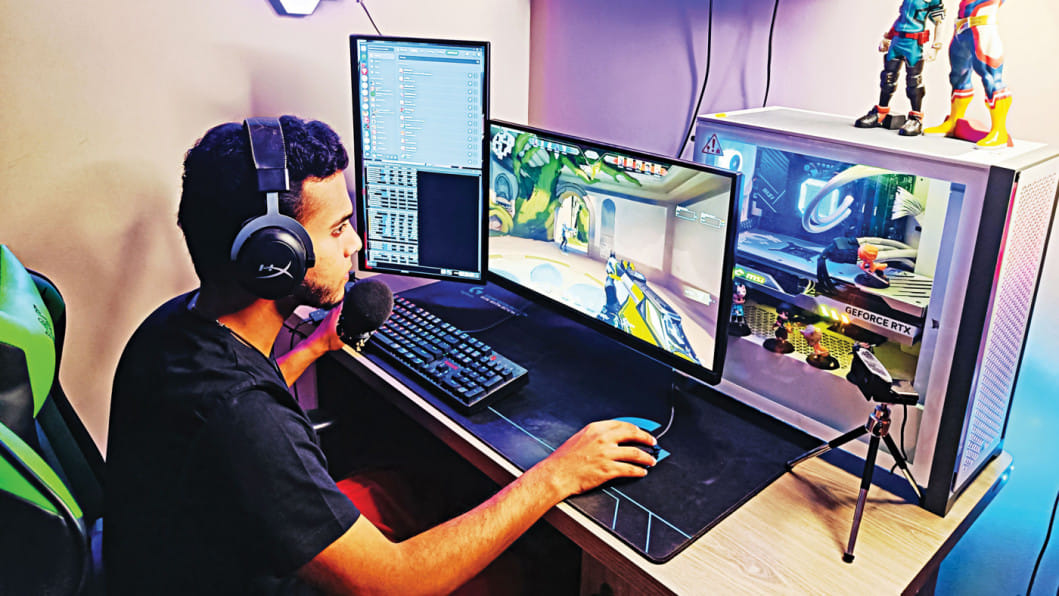Bangladesh lags behind peers in digital adoption for business

Less than half of the companies in Bangladesh use computers, according to a World Bank's survey that revealed the country's weak position in digital adoption for business compared to peer economies and neighboring nations.
According to the Digital Progress and Trends Report 2023, only 46 percent of the firms in Bangladesh used computers between 2019 and 2022 while 50 percent had access to the internet.
Almost 100 percent of the firms in Brazil, Chile, Georgia, India, Korea, Poland, and Vietnam had a computer for business purposes and internet connection during this period.
In contrast, only half of the firms in Bangladesh, Burkina Faso, and Ethiopia had computers.
The report said in addition to low internet speeds, firms in some low-and-middle-income countries also suffer frequent disruptions in internet service.
It mentioned Bangladesh is a country where internet services are often disrupted, leading to loss of competitiveness.
"In Bangladesh, the internet service is predicted to crash seven times per month on average. Such frequent disruptions make it difficult to maintain business continuity and compete with other firms in the global digital economy," the report added.
The grim scenario raises questions about the effectiveness of the government spending thousands of crores of public money for the expansion of the country's optical fiber cable network for broadband internet.
Besides, the government spent tens of thousands of core taka for different projects to achieve its "Digital Bangladesh" vision.
Bangladeshi firms also lagged in using cloud computing services during 2019–22, with only 7 percent of the local businesses using the facility.
Meanwhile, 34 percent of Bangladeshi companies have websites while 23 percent use social media for business.
According to the report, 39 out of every 100 people in Bangladesh use the internet.
This rate is higher than that of Pakistan and Afghanistan, however, it is lower compared to neighboring and peer economies such as India, Sri Lanka, Myanmar, Bhutan and Nepal.
Fahim Mashroor, former president of the Bangladesh Association of Software and Information Services, said the government could not make digital devices and data connectivity cheap enough.
Mobile data could be cheaper if the tax and VAT structure were supportive for this. Also, Quality of the internet is very poor outside major cities, he added.
Mashroor thinks the World Bank report reflects the actual reality of modern technology usage in business.
"One of the main reasons is Bangladesh's businesses are predominantly small-and-medium sized and most don't have any access to funds for investing in computer or network related expenditures," he said.
Also, there are not enough low-cost software solutions for these business entities, Mashroor added.
Bangladesh is classified as a lower middle-income country in the report. On average, 56 percent of the population in such countries use the internet.
The average rate in South Asia is 42 percent. This indicates that Bangladesh falls behind the average rates of both lower middle-income countries and South Asia in terms of internet usage.
According to the World Bank report, 32 percent of the country's population uses the internet on mobile phones.
The rate of smartphone usage among mobile phone users is approximately 51.77 percent. Bangladesh has the lowest smartphone usage rate in South Asia, with Afghanistan also surpassing the country with 55.79 percent.
However, only 18 percent of the people in Afghanistan use the internet.
In other South Asian countries, the percentage of mobile phone users using smartphones is significantly higher: 83 percent in Maldives, 81 percent in Bhutan, 77 percent in India, 70 percent in Sri Lanka, 63 percent in Pakistan and 59 percent in Nepal.
According to the report, Bangladesh, Egypt, Ghana, India, the Kyrgyz Republic, Pakistan, Tunisia, Ukraine and Uzbekistan led the growth of IT services exports during 2019–22.

 For all latest news, follow The Daily Star's Google News channel.
For all latest news, follow The Daily Star's Google News channel. 




Comments